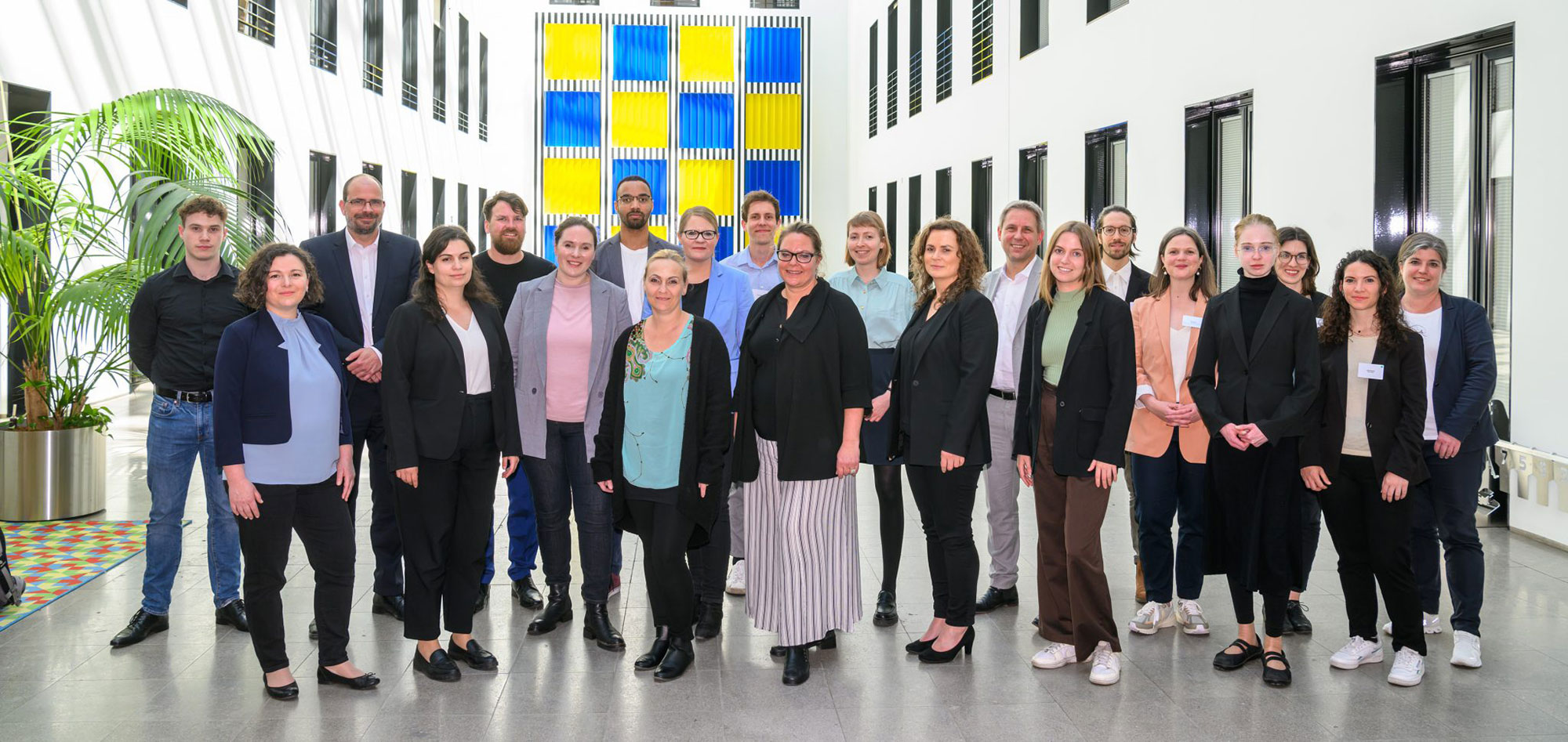
Das DFKI Team
German Research Center for Artificial Intelligence GmbH (DFKI)

The German Research Center for Artificial Intelligence (DFKI) was founded in 1988 as a non-profit public-private partnership (ppp). It has research facilities in Kaiserslautern, Saarbrücken, Bremen, Niedersachsen and Darmstadt, laboratories in Berlin and Lübeck, and a branch office in Trier. In the field of innovative commercial software technology using Artificial Intelligence, DFKI is the leading research center in Germany.
Based on application oriented basic research, DFKI develops product functions, prototypes and patentable solutions in the field of information and communication technology. Research and development projects are conducted in 29 research departments, ten competence centers and eight living labs. Funding is received from government agencies like the European Union, the Federal Ministry of Education and Research (BMBF), the Federal Ministry for Economic Affairs and Climate Action (BMWK), the German Federal States and the German Research Foundation (DFG), as well as from cooperation with industrial partners. Twice a year, a committee of internationally renowned experts (Scientific Advisory Board) audits the progress and results of state-funded projects.
Apart from the state governments of Rhineland-Palatinate, Saarland and Bremen, numerous renowned German and international high-tech companies from a wide range of industrial sectors are represented on the DFKI supervisory board. The DFKI model of a ppp is nationally and internationally considered a blueprint for corporate structure in the field of top-level research.
DFKI is actively involved in numerous organizations representing and continuously advancing Germany as an excellent location for cutting-edge research and technology. Far beyond the country’s borders DFKI enjoys an excellent reputation for its academic training of young scientists. At present, approx. 960 highly qualified researchers, administrators and 600 graduate students from more than 76 countries are contributing to more than 560 DFKI research projects. DFKI serves as a stepping stone to leading positions in industry and successful careers as founders of spin-off companies. Over the years, more than 160 staff members have been appointed professors at universities in Germany and abroad.
More at: www.dfki.de
The Federal Association of Vocational Training Centers (BAG BBW) e.V.

Vocational training centers have a firmly established role in an inclusive labor market. Each year, they train around 15,000 young people with various disabilities and impairments in more than 250 professions. In doing so, they create new opportunities and prospects for vocational participation for many young people. They also serve as a resource for companies in training and recruiting skilled workers.
The vocational training centers and their supporting organizations have joined forces under the umbrella of BAG BBW. Together, they advocate to policymakers, businesses, their partner – the Federal Employment Agency – as well as self-help organizations to:
- Provide tailored services for young people with disabilities to enable their participation in professional and social life,
- Develop business-oriented training formats in cooperation with companies,
- Establish positions on inclusion concepts,
- Promote exchange among vocational training centers and their supporting organizations,
- Initiate innovative research projects.
In a constantly evolving working environment, vocational training centers must act dynamically and agilely. To ensure that vocational rehabilitation remains effective in the future, innovation is essential – only through continuous improvement can it achieve lasting success. This is the mission of BAG BBW.
For more information about BAG BBW e.V., please visit www.bagbbw.de.
The German Federal Association of Vocational Rehabilitation Centers (BV BFW)

The core mission of these centers is to empower individuals who have been unable to perform their previous occupations due to health issues to re-enter the workforce. This is achieved through a comprehensive range of over 250 training courses, integration activities and other services provided by the BFWs. Currently, more than 15,000 people with health impairments are making use of BFW’s services to enable their participation in working life.
The BV BFW and its members comprise an extensive network of approximately 5.000 qualified employees, working together in interdisciplinary teams of trainers, medical, psychological, socio-educational, and therapeutic staff. This network unites a wealth of knowledge and expertise in areas such as prevention, counselling, diagnostics, professional reorientation, qualification and integration into the primary labor market.
As partners of companies, the Federal Association and the BFWs are committed to supporting small to medium-sized enterprises (SMEs) and large companies in overcoming labor market demographic challenges and in securing skilled workers.
For additional information about the BV BFW, please visit our website www.bv-bfw.de. (Note: this website is currently only available in German).
Bundesarbeitsgemeinschaft Werkstätten für behinderte Menschen e. V. (BAG WfbM)

Bundesarbeitsgemeinschaft Werkstätten für behinderte Menschen e. V. (BAG WfbM) is the German Federal association of sheltered workshops with its headquarter in Berlin.
BAG WfbM is providing its roughly 700 members with services such as expert advice on questions related to employment, vocational education, financing and legal issues. BAG WfbM advocates for the participation of people with disabilities in working life, it cooperates with other associations for people with disabilities and service providers and represents the interests of their members in all relevant legal and political matters. In Germany, sheltered workshops are highly specialised facilities for vocational rehabilitation who enable people with severe disabilities to participate in working life. In roughly 3,000 subsidiaries they provide vocational education, work opportunities and support in personal development for around 310,000 people with intellectual, psychological and severe and multiple disabilities.
In 2023, 93 % of the German sheltered workshops were organized in BAG WfbM.
Further information about BAG WfbM can be found at www.bagwfbm.de

